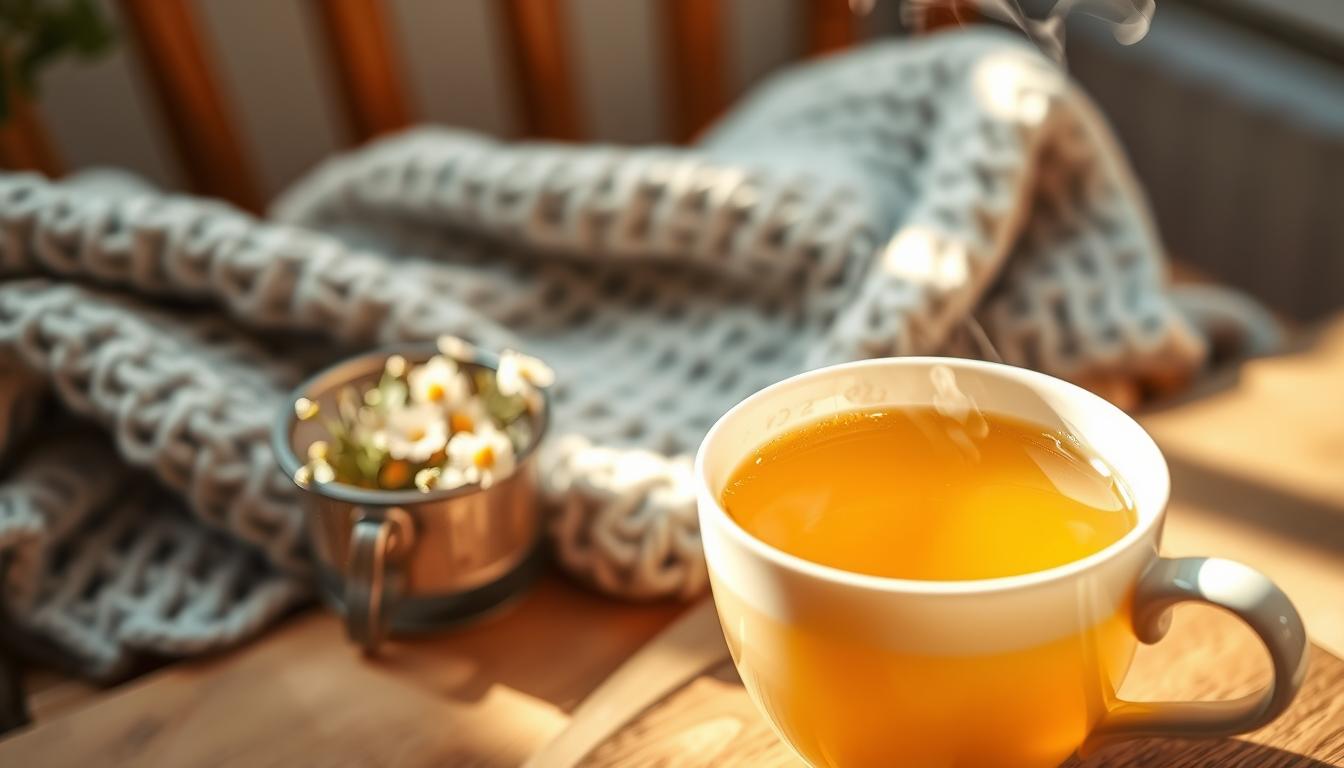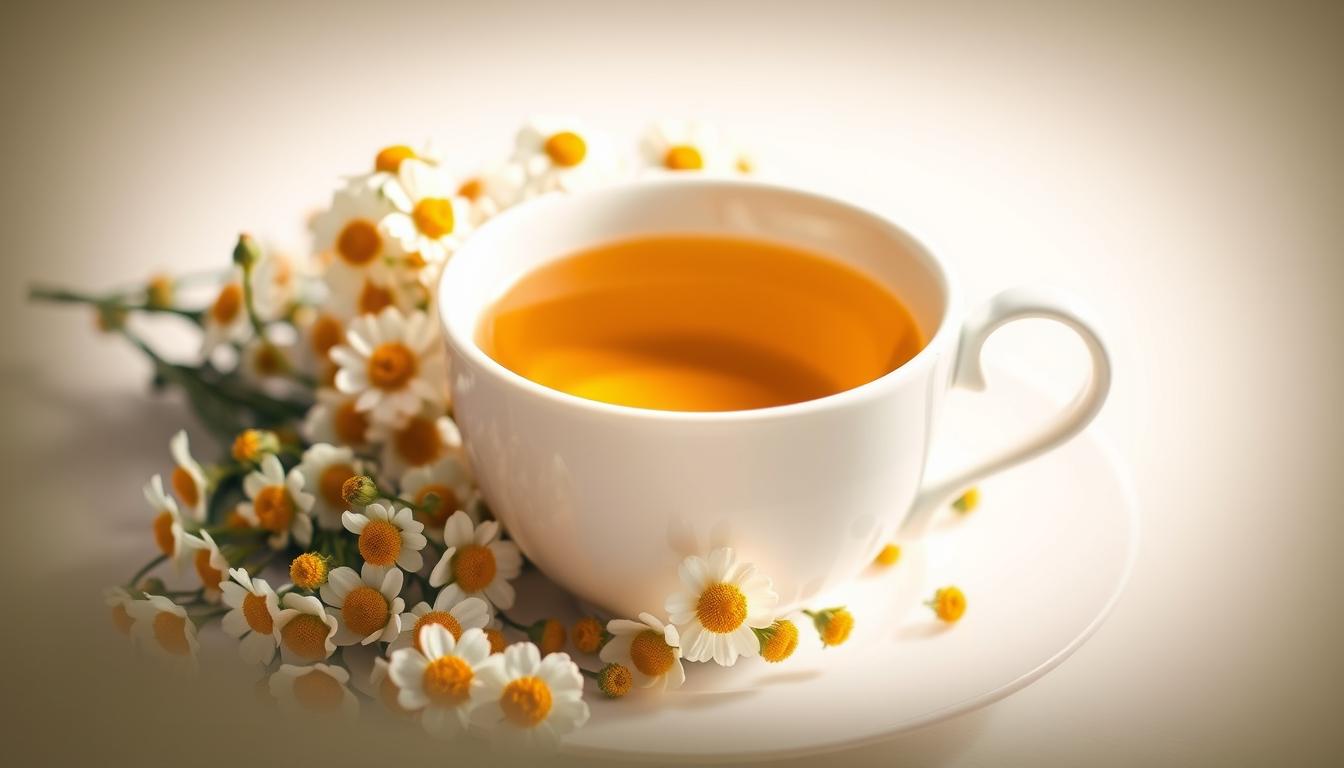Did you know that nearly 80% of pregnant women turn to herbal remedies for relief from common discomforts? Among these, chamomile tea stands out as a popular choice. Known for its calming properties, this herbal infusion has been used for centuries to ease anxiety, improve sleep, and soothe nausea.
Despite its long history, modern research on its safety during pregnancy remains limited. Some studies suggest potential risks, such as preterm labor or low birth weight. This conflicting evidence leaves many expecting mothers wondering if it’s a safe option.
This article dives into the benefits, risks, and scientific findings surrounding chamomile tea. We’ll explore its traditional uses, examine the latest research, and provide guidelines to help you make informed decisions. Rest assured, our insights are drawn from reputable sources to offer clarity and peace of mind.
Key Takeaways
- Chamomile tea has been traditionally used for anxiety, sleep, and nausea relief.
- Modern research on its safety during pregnancy is inconclusive.
- Potential risks include preterm labor and low birth weight.
- Consulting a healthcare provider is essential before use.
- This article provides evidence-based insights for informed decisions.
Introduction to Chamomile Tea and Pregnancy
Herbal teas have become a go-to remedy for many expecting mothers. Their natural ingredients and soothing properties make them a popular choice for addressing common discomforts. Among these, chamomile stands out for its calming effects and long history of use.

Overview of Herbal Teas in Pregnancy
During pregnancy, women often seek alternatives to caffeinated beverages. Herbal infusions, such as peppermint, ginger, and chamomile, offer a caffeine-free option. These teas are derived from natural sources like leaves, flowers, and roots, making them appealing for their gentle effects.
Each type of herbal tea serves a unique purpose. For example, ginger is known to ease nausea, while peppermint can soothe digestion. Chamomile, with its mild flavor, is often chosen for relaxation and better sleep.
Understanding Common Concerns
Despite their popularity, herbal teas raise questions about safety. Pregnant women often worry about potential risks, such as preterm labor or allergic reactions. Limited research adds to the uncertainty, making it essential to approach herbal remedies with caution.
Symptoms like morning sickness and anxiety often lead women to explore these natural solutions. However, moderation is key. Overconsumption of certain herbs may pose risks, highlighting the importance of consulting a healthcare provider before use.
Current research offers mixed insights. While some studies highlight benefits, others caution against potential adverse effects. This underscores the need for informed decisions and professional guidance when incorporating herbal teas into a pregnancy routine.
Historical Use of Chamomile and Herbal Teas
The roots of herbal medicine trace back to ancient civilizations. For thousands of years, natural remedies have been a cornerstone of health and wellness. Among these, chamomile stands out for its long-standing use in addressing various ailments.

Traditional Medicinal Purposes
Chamomile has been a trusted herb for centuries. Ancient Egyptians, Greeks, and Romans valued it for its calming properties. It was often used to ease anxiety, soothe digestive issues, and promote better sleep.
In folk medicine, chamomile was a go-to remedy for sleeplessness and upset stomachs. Its mild flavor and gentle effects made it a favorite among herbal infusions. Other herbs, like peppermint and ginger, also gained popularity for their unique benefits.
Evolution of Herbal Remedies Over Centuries
Herbal infusions have evolved significantly over time. What began as traditional practices in ancient cultures has now become a global wellness trend. Modern applications of these remedies are backed by scientific research, though safety evaluations remain ongoing.
Despite their historical use, not all herbal remedies are fully validated for specific conditions, such as pregnancy. This highlights the importance of balancing traditional knowledge with modern evidence.
| Traditional Use | Modern Application |
|---|---|
| Calming anxiety | Stress relief supplements |
| Soothing digestion | Digestive health teas |
| Promoting sleep | Sleep aid products |
Today, herbal medicine continues to integrate into wellness practices. However, rigorous scientific analysis ensures safety and efficacy, especially for sensitive groups like pregnant women.
is chamomile tea safe for pregnancy
Many women wonder about the safety of chamomile tea during pregnancy. This herbal infusion is known for its calming effects, but its use during this sensitive period raises questions. Research on the topic remains limited, leaving many expecting mothers uncertain.
Current studies offer mixed findings. Some suggest potential benefits, such as reducing nausea and promoting relaxation. However, others highlight concerns like preterm labor or low birth weight. These risks make it essential to approach chamomile tea with caution.
Compared to other herbal infusions, chamomile tea’s safety profile is less clear. While ginger and peppermint are often considered safer options, chamomile’s effects on pregnancy require further investigation. Observational studies have linked regular consumption to adverse outcomes, emphasizing the need for moderation.
Despite its traditional use, the absence of rigorous clinical trials means caution is necessary. Consulting a healthcare provider before incorporating chamomile tea into your routine is highly recommended. This ensures personalized advice based on your unique health needs.
In the next sections, we’ll explore broader research findings to provide a clearer picture. Understanding the risks and benefits can help you make informed decisions during this important time.
Scientific Research and Evidence Review
Scientific studies provide insights into the effects of herbal infusions during sensitive periods. While these remedies are widely used, their safety during pregnancy remains a topic of debate. Current research offers mixed findings, emphasizing the need for evidence-based guidance.
Regulatory Insights and FDA Considerations
The U.S. FDA classifies chamomile as a dietary supplement rather than a medicine. This means it is not subject to the same rigorous testing as pharmaceuticals. Limited safety data exists, and the FDA advises caution when using herbal supplements during pregnancy.
Small-scale studies have raised concerns about potential risks. For example, some research links chamomile to uterine activity and ductal constriction. These findings highlight the importance of consulting a healthcare provider before use.
Study Findings on Preterm Births and Birth Weight
Several studies have explored the impact of herbal infusions on pregnancy outcomes. Some suggest a connection between regular consumption and preterm labor or lower birth weight. However, these studies often suffer from small sample sizes or observational designs.
Systematic reviews aim to consolidate existing evidence, but results remain inconclusive. Researchers face challenges due to the lack of large-scale clinical trials. Until more comprehensive data is available, caution is advised.
| Study Focus | Findings |
|---|---|
| Preterm Labor | Potential association with herbal tea consumption |
| Birth Weight | Some evidence of lower birth weight |
| Uterine Activity | Possible increase in contractions |
While herbal infusions like chamomile have a long history of use, modern research underscores the need for caution. Evidence-based guidance from a healthcare provider is essential to ensure safety during pregnancy.
Benefits of Herbal Teas During Pregnancy
Expecting mothers often seek natural remedies to manage common discomforts. Herbal infusions, like chamomile and ginger, are popular choices for their gentle effects. These drinks are known to improve sleep, ease nausea, and reduce mild anxiety.
Improving Sleep and Reducing Nausea
Many women find that herbal infusions help them sleep better. Chamomile, in particular, is known for its calming properties. It can promote relaxation and reduce stress, making it easier to rest.
Nausea and morning sickness are common concerns during this time. Ginger tea is a well-known remedy for easing these symptoms. Chamomile also has a traditional use in soothing upset stomachs.
Easing Mild Anxiety
Pregnancy can bring about feelings of anxiety and stress. Herbal infusions like chamomile may help manage these emotions. Their calming effects can provide a sense of well-being and relaxation.
While these benefits are promising, moderation is key. Overconsumption of herbal infusions may pose risks. Always consult a healthcare provider before adding them to your routine.
| Herbal Infusion | Primary Benefit |
|---|---|
| Chamomile | Improves sleep, reduces anxiety |
| Ginger | Eases nausea and morning sickness |
Herbal infusions can play a supportive role in a holistic approach to wellness. However, the lack of large-scale studies means benefits should be weighed against potential risks. Always prioritize safety and professional guidance.
Potential Risks and Adverse Outcomes
Understanding the potential risks of herbal infusions is crucial for expecting mothers. While these remedies are often praised for their natural benefits, they may pose certain dangers during this sensitive period. Awareness and caution can help mitigate these risks.
Interactions with Medications and Side Effects
Herbal infusions like chamomile can interact with certain medications. For example, blood thinners may become less effective when combined with chamomile. This increases the risk of complications, especially during pregnancy.
Side effects are another concern. Allergic reactions, excess sedation, and worsened nausea have been reported. These symptoms can vary depending on the individual and the amount consumed.
Concerns Over Miscarriage and Preterm Labor
Excessive consumption during the third trimester has been linked to uterine contractions. This raises concerns about preterm labor and low birth weight. Observational studies suggest a possible association, though causation remains unproven.
Miscarriage is another potential risk, particularly with high intake. While evidence is not definitive, moderation is key. Limiting the amount and frequency of herbal infusions can reduce these risks.
Always consult a healthcare provider before incorporating herbal remedies into your routine. Professional guidance ensures safety and helps you make informed decisions during this important time.
Herbal Tea Consumption Guidelines for Pregnant Women
Navigating herbal tea consumption during pregnancy requires careful consideration and expert guidance. While these infusions offer natural benefits, their use during this sensitive period demands moderation and professional advice.
Doctor Consultation and Recommended Dosage
Before incorporating herbal infusions into your routine, consult your healthcare provider. They can offer personalized advice based on your health history and current needs. This step ensures safety and minimizes potential risks.
Most guidelines suggest limiting intake to two to three cups per day. However, this amount may vary depending on the herb’s potency and your trimester. For example, some herbs are safer in the first trimester but may pose risks later.
Moderation is key. Exceeding recommended amounts can lead to adverse effects, such as uterine contractions or allergic reactions. Always read product labels to check for undisclosed ingredients or additives.
| Herbal Infusion | Recommended Dosage | Safety Tips |
|---|---|---|
| Chamomile | 1-2 cups/day | Avoid in third trimester |
| Ginger | 2-3 cups/day | Safe for nausea relief |
| Peppermint | 1-2 cups/day | Limit in first trimester |
Personalized medical advice is crucial. Your healthcare provider can help you balance the benefits and risks, ensuring a safe and healthy pregnancy. By following these guidelines, you can enjoy herbal infusions responsibly.
Comparing Chamomile Tea to Other Pregnancy Teas
When exploring herbal infusions during pregnancy, it’s helpful to compare their benefits and risks. Chamomile is often chosen for its calming effects, but alternatives like ginger and peppermint may offer similar benefits with fewer concerns. Understanding the differences can help you make informed choices.
Safer Alternatives and Their Effects
Ginger and peppermint are popular choices for managing nausea and improving sleep. Ginger is well-known for easing morning sickness, while peppermint can soothe digestion. Both are generally considered safer than chamomile, especially in later stages.
Green tea is another option, though it contains caffeine. While it offers antioxidants, its caffeine content requires careful monitoring. Staying within the recommended daily limit is essential to avoid potential risks.
Caffeine Content and Nutrient Profiles
Caffeine levels vary significantly between herbal infusions. Chamomile and peppermint are caffeine-free, making them suitable for those avoiding stimulants. Green tea, however, contains moderate caffeine, which should be consumed in moderation.
Nutrient profiles also differ. Ginger is rich in antioxidants, while peppermint offers menthol, known for its soothing properties. Green tea provides catechins, which support overall health. These differences highlight the importance of choosing the right infusion for your needs.
| Herbal Infusion | Primary Benefit | Caffeine Content |
|---|---|---|
| Chamomile | Calming, improves sleep | Caffeine-free |
| Ginger | Eases nausea | Caffeine-free |
| Peppermint | Soothes digestion | Caffeine-free |
| Green Tea | Rich in antioxidants | Moderate caffeine |
While chamomile has a long history of use, its potential risks during pregnancy make alternatives worth considering. Always consult your healthcare provider to determine the best option for your unique situation.
Conclusion
Making informed choices about herbal infusions during this special time ensures both mother and baby’s well-being. While chamomile tea offers calming effects and has been used for centuries, current evidence calls for caution. Studies highlight potential risks, such as uterine activity or adverse outcomes, making moderation essential.
Historical use and modern research provide valuable insights, but larger-scale studies are needed to confirm safety. Always consult a healthcare provider before incorporating herbal remedies into your routine. Personalized advice ensures the best decisions for your unique situation.
Remember, moderation and awareness are key. By staying informed and seeking professional guidance, you can navigate this journey with confidence. Together, these steps lead to healthier outcomes for both woman and baby.

